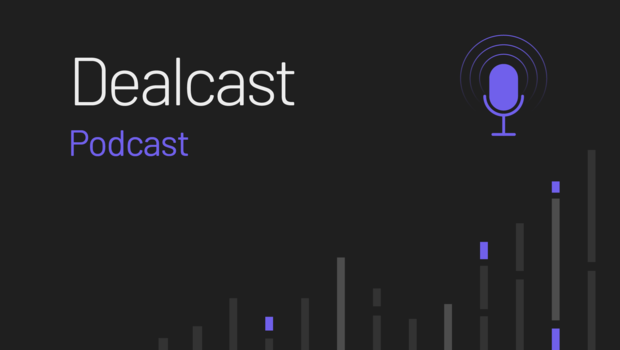Podcast: Is Shareholder Activism Picking up in Europe?
6 August 2021
How companies can be targeted by different types of investors
To learn how companies can be targeted by different types of investors, host Julie-Anna Needham is joined by Giulia Lasagni, assistant editor for Activistmonitor, and Claudia De Meulemeester, a reporter for Activistmonitor. Dealcast is presented by Mergermarket and SS&C Intralinks.
In this episode, you'll hear about:
- How the pandemic has affected shareholder activism.
- What kind of activism are corporates now vulnerable to.
- Why activism is increasing in certain sectors.
Transcript
JULIE-ANNA NEEDHAM: Welcome to Dealcast, the weekly M&A podcast presented to you by Mergermarket and SS&C Intralinks. I'm Julie-Anna Needham.
This week, we're looking at shareholder activism in Europe. Whilst activity has been somewhat muted during the past year as a result of the pandemic, things are picking up. I'm joined by Giulia Lasagni, assistant editor for Activistmonitor, and Claudia de Meulemeester, is a reporter for Activistmonitor.
Hi, Julia. Hi, Claudia.
GIULIA LASAGNI: Hello.
CLAUDIA DE MEULEMEESTER: Hi, there.
JULIE-ANNA NEEDHAM: So thanks very much for joining us today. Can you begin by explaining how shareholder activism in Europe has changed during the past year as a result of the pandemic?
GIULIA LASAGNI: We found out that shareholder activism in Europe kept companies quite busy in the first half of the year despite the COVID-19 crisis and that campaigns are expected to increase going forward. However, there was some kind of armistice, let's call it that way, due to COVID.
So perhaps the activity was in fact slightly lower than expected due to the prolonged lockdown and the ongoing crisis. Some people told us that many activists were waiting to see the outcome of the crisis and so were thinking about the next steps, and those next steps might in fact materialize towards-- well, in the rest of the year.
We found that there were 20 new campaigns in the first half of 2021, and that compares with 30 in the same period last year according to data compiled by Activistmonitor. There were 20 new campaigns in the first half of 2021 down from 30 in the same period last year according to data compiled by Activistmonitor. Activity is poised to pick up later this year as things get better, also, from an M&A point of view.
JULIE-ANNA NEEDHAM: So what kind of activism are corporates now vulnerable to?
CLAUDIA DE MEULEMEESTER: Yes, so I think corporates will be vulnerable to several types of activism at once just because of how the COVID crisis has really had an impact on every aspect of a business. So restructuring is a big theme, for example, cost-cutting, as well.
Companies really need to be as efficient as possible. Many of them have started doing strategic reviews just to see how their business can really align with the world after COVID-19. So those are all themes that activists can play into.
As opposed to last year, as Giulia mentioned earlier, there was definitely an armistice where activists had to slow down their demands or just take a pause. So we didn't see any sort of demands related to share buybacks, dividends, return of capital, but we see that coming back now.
So this is a very interesting development where some type of activists are actually coming back to the market and making those return demands again. So that will be something interesting to look forward to.
But then, ESG, for example, has also become a big theme, so there are different ways in which companies can be attacked by very different types of investors. So what the data is telling us is that companies have to be really on the forefront of being proactive and being ahead of what kind of vulnerabilities they have to these investors.
JULIE-ANNA NEEDHAM: So we've touched on some of it already, but can we look in a bit more detail at some of those big themes that are prompting M&A and how those themes are leading to activism?
GIULIA LASAGNI: Yes so one of the big themes was certainly portfolio activism. That's when an activist argues, for example, in favor of the sale of a business unit of a company. For instance, Elliott is thought to be of the opinion that he could push for the sale of GSK's consumer units.
So just to give you an example of the kind of activism that portfolio activism is, another theme we found is that more activists are targeting the same company. For example, several investors have been targeting Danone, the French consumer company. And then as Claudia mentioned, ESG is obviously a huge trend these days.
CLAUDIA DE MEULEMEESTER: Yeah, ESG is one of the drivers of M&A which we have identified in a number of ways. In the past couple of weeks, themes that perhaps pre-pandemic were less popular now, more investors are looking into, and this goes beyond climate.
So for example, the S is becoming more prominent. You can see that in especially remuneration packages where activist investors are really asking companies to disclose how an executive will have a package that is aligned with the ESG goals of the general overall business.
But as said earlier, share buybacks, returns of capital are making a comeback, and a clear example of that is happening at British insurer, Aviva, with CVN capital asking for over USD five billion of return of capital.
So it's a very interesting way, especially because Aviva has had a full disposal program already in place, and now our shareholders are trying to get a piece of the cake of that, as well, so we'll see how that develops going forward.
JULIE-ANNA NEEDHAM: And looking at sectors, are particular sectors seeing increased targeting from activists?
GIULIA LASAGNI: Yes, according to our data, the financial, industrial, and consumer sectors were the most targeted by activists during the first half of the year. The industrial sector is expected to continue to see a fair amount of activity. The consumer sector, as well, along with health care and technology according to some of the sources we spoke to.
JULIE-ANNA NEEDHAM: And what is the reason for the increased activity in those sectors?
GIULIA LASAGNI: Yes, in the industrial sector, for example, there could be opportunities produced by the fact that there are high fixed cost basis, heavy capital needs, but on the other hand, low return on capital, weak cash generation, and at the same time, M&A opportunities.
CLAUDIA DE MEULEMEESTER: And also, furthermore, macroeconomic teams around digitalization of businesses, carbon neutrality goals, will all also help stimulate this environment. And these specific sectors are really trying to navigate the crisis and be in a strong position for when the world returns to some sort of new normal.
JULIE-ANNA NEEDHAM: Thank you. And so what can publicly listed companies do to protect themselves from activists and identify their vulnerabilities?
CLAUDIA DE MEULEMEESTER: So activism defense has been around for a long time. Especially in the UK, companies are quite proactive in hiring activism defense advisors, both before being attacked and afterwards. But most interesting is a new development where full-on simulation attacks are being organized by advisors.
However, according to our sources, it's not as easy as it sounds just because these advisors really need to ask difficult questions to the board, to the executives, and sometimes, those answers are very difficult to give and are not really pleasant. But this is one way of being fully prepared and proactive for a potential call from an activist saying, I have bought stock.
So there are different ways in which boards can be proactive and their advisors can help them. Simulation tech's one of them. Having a very strong board to connect it, making sure communication is key across the board, across the whole hierarchy of the company. Investor relations is key, as well, but also stakeholders. More and more need to be really involved, to really feel part of the company.
JULIE-ANNA NEEDHAM: And when you speak about the simulation attacks, how prevalent are they? How many companies are trying to do that to prepare themselves or be as best prepared as they can?
CLAUDIA DE MEULEMEESTER: From what we've been told, not as many companies are doing as they should but, the whole PLC spectrum should really be prepared in having these kinds of attacks as part of their defense manual going forward.
JULIE-ANNA NEEDHAM: And it sounds like that might be a growing area of the advisory community?
CLAUDIA DE MEULEMEESTER: Correct, and not only in terms of M&A but also in terms of ESG. It has to really portray the 360-degree stakeholder perspective because a company, as we've said before, it will be vulnerable to more aspects senders one.
JULIE-ANNA NEEDHAM: Great, Claudia and Julia, thank you very much.
GIULIA LASAGNI: Thank you for having us.
CLAUDIA DE MEULEMEESTER: Thank you.
JULIE-ANNA NEEDHAM: That was Giulia Lasagni and Claudia de Meulemeester. Thank you for listening to this week's episode of Dealcast presented by Mergermarket and SS&C Intralinks. Please rate, review, and follow the podcast. You can find us on Apple Podcasts, Spotify, or look out for your Mergermarket news alert. For more information, check out our show notes. Join us next week for another episode.


